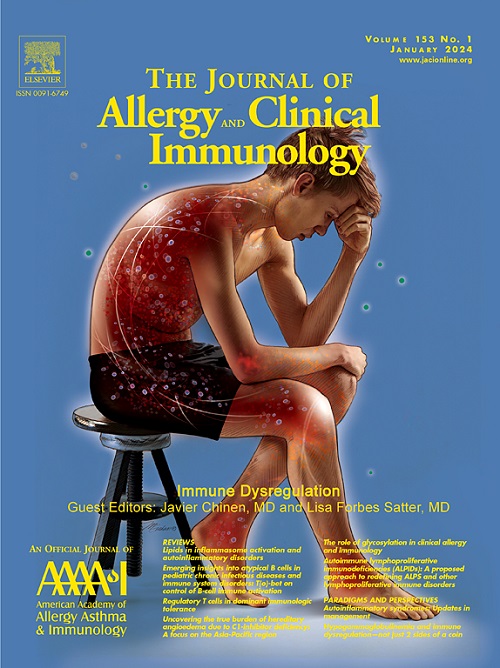Efficacy and safety of GR1802 in uncontrolled chronic rhinosinusitis with nasal polyps: Placebo-controlled phase 2 trial
IF 11.4
1区 医学
Q1 ALLERGY
引用次数: 0
Abstract
Background
Anti–IL-4 receptor subunit alpha (IL-4Rα) treatments can effectively treat eosinophilic chronic rhinosinusitis with nasal polyps (ECRSwNP). However, their impact on the overall population of patients with uncontrolled CRSwNP remains unclear.
Objectives
We evaluated the safety and efficacy of GR1802, a novel anti–IL-4Rα monoclonal antibody, in patients with uncontrolled CRSwNP.
Methods
Seventy patients with uncontrolled CRSwNP were randomized (1:1) to receive either GR1802 (300 mg with an initial doubled dose) or placebo every 2 weeks. Primary end points were the changes from baseline in nasal polyp score and nasal congestion score at week 16. Secondary end points mainly included change from baseline in Total Nasal Symptom Score (TNSS), 22-item Sino-Nasal Outcome Test (SNOT-22) score, and Lund-Mackay score. Efficacy (exploratory) was also analyzed in ECRSwNP and non-ECRSwNP subgroups. Safety was evaluated throughout the study.
Results
In uncontrolled CRSwNP participants, GR1802 significantly improved nasal polyp score and nasal congestion score compared with placebo, with least squares mean differences of −2.1 (95% confidence interval, −2.6, −1.5) and −0.8 (95% confidence interval, −1.1, −0.4), respectively. Participants treated with GR1802 had significantly decreased TNSS, SNOT-22 score, and Lund-Mackay score. The subgroup analysis demonstrated that GR1802 improved the symptoms and quality of life in both ECRSwNP and non-ECRSwNP participants, as evidenced by changes in nasal polyp score, University of Pennsylvania Smell Identification Test score, and Lund-Mackay score. Treatment-related adverse events occurred in 19.4% of the GR1802 group and 17.6% of the placebo group.
Conclusion
GR1802 is well tolerated and effective in treating the overall population with uncontrolled CRSwNP.
GR1802在非对照CRSwNP中的有效性和安全性:安慰剂对照2期试验。
背景:抗白细胞介素-4受体亚单位α (IL-4Rα)治疗嗜酸性慢性鼻窦炎伴鼻息肉(ECRSwNP)有效。然而,它们对不受控制的CRSwNP总体人群的影响尚不清楚。目的:评价新型抗il - 4r α单克隆抗体GR1802在未控制的CRSwNP患者中的安全性和有效性。方法:70名未控制的CRSwNP参与者被随机分配(1:1),每2周接受GR1802 (300 mg,初始剂量加倍)或安慰剂。主要终点是第16周鼻息肉评分(NPS)和鼻塞评分(NCS)较基线的变化。次要终点主要包括鼻症状总评分(TNSS)、22项鼻预后测试(SNOT-22)评分和Lund-Mackay评分较基线的变化。在ECRSwNP和NECRSwNP亚组中也分析了疗效(探索性)。在整个研究过程中对安全性进行了评估。结果:在未控制的CRSwNP参与者中,与安慰剂相比,GR1802显著改善了NPS和NCS,最小二乘(LS)平均差异分别为-2·1(95%置信区间[CI][-2·6,-1·5])和-0·8 (95% CI[-1, -0·4])。接受GR1802治疗的受试者TNSS、SNOT-22评分和Lund-Mackay评分均显著降低。亚组分析表明,GR1802改善了ECRSwNP和NECRSwNP参与者的症状和生活质量,NPS、宾夕法尼亚大学气味识别测试(UPSIT)评分和隆德-麦基评分的变化证明了这一点。GR1802组和安慰剂组的不良事件发生率分别为19.4%和17.6%。结论:GR1802在治疗总体人群不受控制的CRSwNP中具有良好的耐受性和有效性。
本文章由计算机程序翻译,如有差异,请以英文原文为准。
求助全文
约1分钟内获得全文
求助全文
来源期刊
CiteScore
25.90
自引率
7.70%
发文量
1302
审稿时长
38 days
期刊介绍:
The Journal of Allergy and Clinical Immunology is a prestigious publication that features groundbreaking research in the fields of Allergy, Asthma, and Immunology. This influential journal publishes high-impact research papers that explore various topics, including asthma, food allergy, allergic rhinitis, atopic dermatitis, primary immune deficiencies, occupational and environmental allergy, and other allergic and immunologic diseases. The articles not only report on clinical trials and mechanistic studies but also provide insights into novel therapies, underlying mechanisms, and important discoveries that contribute to our understanding of these diseases. By sharing this valuable information, the journal aims to enhance the diagnosis and management of patients in the future.

 求助内容:
求助内容: 应助结果提醒方式:
应助结果提醒方式:


